Portret de voluntar – Justhine (Franța)
My name is Justhine, I am 18 years old and I am from Tourcoing, in France. I am sociable, listening to people, I love laughing and do funny work. In my free time, I like to knit and watch series or movies, I love and I need sports, I like playing rugby, basketball, dance…
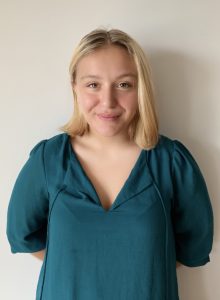
I am a new volunteer in Curba de Cultura, I came to work with young people, to prepare and create activities, to learn languages, and more other things. I am in Romania for an EVS for 7 month.
I have always wanted to go in another country. This year, I didn’t really know what I wanted to do in school so I thought it was the good time to do my dream. When I was in school holidays, I worked in a social center with children. When Adice suggested me to work with Curba de Cultura, I said yes right away because it was my two favorites projects of my life together.
—
Numele meu este Justhine, am 18 ani și sunt din Tourcoing, Franța. Sunt sociabilă, ascult oamenii, îmi place să râd și să fac lucruri amuzante. În timpul liber îmi place să tricotez și să vizionez seriale sau filme, îmi place și am nevoie de sport, îmi place să joc rugby, baschet și să dansez…
Sunt voluntar nou în Curba de Cultură, am venit să lucrez cu tineri, să pregătesc și să creez activități, să învăț limbi străine și multe alte lucruri. Sunt în România pentru un EVS de 7 luni.
Întotdeauna mi-am dorit să merg în altă țară. Anul acesta nu prea știam ce vreau să fac la școală, așa că am crezut că este momentul potrivit pentru a-mi îndeplini visul. Când eram în vacanța școlară, lucram într-un centru social cu copiii. Când Adice mi-a sugerat să colaborez cu Curba de Cultură, am spus “da” imediat, pentru că erau împreună două proiecte preferate ale vieții mele.
Portret de voluntar – Jan (Norvegia)
[En]
Hi my name is Jan Henri Christensen and this is my second EVS project within the European Solidarity Corps, I am 20 years old and love making a change no matter how small or big it is.
My origin is from Norway but my blood is 50% Turkish, I have a strong love for my family that has supported this decision in my life.
I am a person that loves people and strives in making others around me happy as I view their happiness as my own happiness.
I love making food, especially cakes (might need the recipe though) and I have a somewhat growing fascination for technological development too.
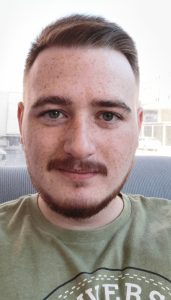
[Ro]
Bună, mă numesc Jan Henri Christensen și acesta este pentru mine al doilea proiect EVS din cadrul Corpului European de Solidaritate, am 20 de ani și îmi place să schimb lucrurile în jurul meu, indiferent cât de mici sunt acestea.
La origine sunt norvegian dar am 50% origini turcești, îmi iubesc foarte mult familia, care m-a susținut să iau această decizie.
Sunt o persoană care iubește oamenii și mă straduiesc mereu să-i fac pe cei din jurul meu fericiți, astfel devenind si eu fericit.
Îmi place să gătesc, mai ales prăjituri (deși am nevoie de rețetă) și deasemea mă fascinează progresul tehnologic.
Portret de voluntar – Danelle (Malta)
[En]
Hi, My name is Danelle Sciberras. I am 19 years old. I am from a small island in the Mediterranean sea called Malta. I am from a town called Kalkara but I live in Żabbar. I like to travel, exploring new cultures and languages and also their food. I love nature and all its beauty she has to offer. I like to watch movies and reading books as well. I love all kinds of animals especially cats and dogs. I grew up with old Maltese traditions which nowadays they are not so common anymore. I studied a course in college called Health and Social care for 2 years and I passed and I could’ve worked as a social support worker. I wanted to continue studying so I went on to a Bachelor degree course but I didn’t feel comfortable studying management. I am more of a hands on person and this course was mostly about writing and implementing policies. I was unhappy so I left and went to work. I volunteered a lot when I was younger and recently volunteered with amazing kids. For a couple of years I have been interested in doing an EVS and finally I found one that I like and interests me. I am looking forward to everything in these 10 months. 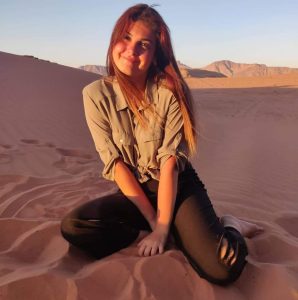
[Ro]
Bună, mă numesc Danelle Sciberras.
Eu am 19 ani. Sunt dintr-o insulă mică din Marea Mediterană numită Malta. Sunt dintr-un oraș numit Kalkara, dar locuiesc în Żabbar. Îmi place să călătoresc, să explorez culturi și limbi noi și, de asemenea, mâncarea lor. Îmi place natura și toată frumusețea pe care o are de oferit. Îmi place să vizionez filme și să citesc. Ador toate animalele, în special pisicile și câinii. Am crescut cu vechi tradiții malteze care în zilele noastre nu mai sunt atât de comune. Am studiat un curs în colegiu numit Sănătate și Îngrijire Socială timp de 2 ani putând să lucrez ca și asistent social.
Am vrut să continui studiile, așa că am continuat un curs de licență, dar nu m-am simțit confortabil studiind managementul. Sunt o persoană consecventă, iar acest curs a fost în mare parte despre scrierea și implementarea politicilor. Am fost nefericită așa că am plecat și am început să lucrez. Am făcut voluntariat foarte mult când eram mai tânără și recent am desfășurat activități de voluntariat cu o serie de copii uimitori. De câțiva ani mă interesează un proiect în cadrul EVS și în cele din urmă am găsit unul care îmi place și care mă interesează. Astept cu nerăbdare aceste 10 luni.
Portret de voluntar – Jānis (Latvia)
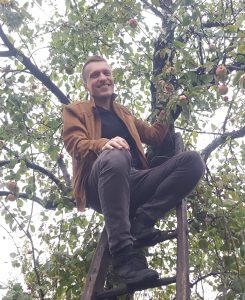
[En]
Hi everybody,
My name is Jānis Jēkabsons and I am 29 years old. I come from Rūjiena, a small rural town in the northern part of Latvia. I grew up in a farmhouse that brought me in close contact with nature and animals, something that will be a lifelong love for me. This is one of the reasons why I am delighted to stay in the lovely village of Schiulesti. Going abroad has always been one of my life goals. I can’t wait to learn the Romanian language.
Education to me is a never-ending process. My formal education includes history and diplomacy. Things that I am interested in are sports, outdoor activities, studying different topics of interest, spiritual practices, traveling, personal development and helping others. My dream is to become a life (transformational) coach and facilitate change.
I am here to provide as much value as I can to the local communities of Romania. I also expect to learn a lot from locals and other volunteers.
Life is like a ladder – never stop climbing to reach new heights, even if you keep falling again and again and again. Persistence and consistent action equal success. We are here to learn, grow, enjoy and support the lives of others!
Much love and see you all soon!
[Ro]
Bună tuturor,
Numele meu este Jānis Jēkabsons și am 29 de ani. Vin din Rūjiena, un orășel rural din partea de nord a Letoniei. Am crescut într-o fermă ce m-a adus aproape de natură și animale, care vor rămâne pentru mine o dragoste constantă pentru tot restul vieții. Acesta este unul dintre motivele pentru care sunt încântat să stau în minunatul sat Schiulești. Plecarea în străinătate a fost întotdeauna unul dintre obiectivele mele în viață. Abia aștept să învăț limba română.
Educația pentru mine este un proces care nu se încheie niciodată. Educația mea formală include istorie și diplomație. Lucrurile care mă interesează sunt sportul, activitățile în aer liber, studierea diferitelor subiecte de interes, practicile spirituale, călătoriile, dezvoltarea personală și ajutorarea celorlalți. Visul meu este de a deveni un life coach(transformațional) și de a facilita schimbarea.
Sunt aici pentru a valorifica pe cât mai mult posibil comunitățile locale din România. De asemenea, mă aștept să învăț multe de la localnici și alți voluntari.
Viața este ca o scară – nu înceta niciodată să urci pentru a atinge înălțimi noi, chiar dacă vei continua să cazi din nou și din nou și din nou. Perseverența și acțiunea consecventă sunt egale cu succesul. Suntem aici pentru a învăța, crește, bucura și susține viața altora!
Multă dragoste și ne vedem în curând!
Portret de voluntar – Ana (Andalucia)
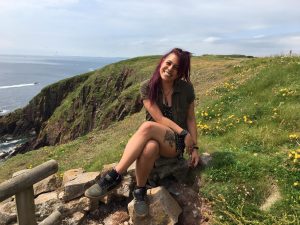
[En]
HOLA! My name is Ana and I come from Andalucia, a beautiful land in España. I like to say the name of my region because for me it is one of the better places in the world to enjoy the life (even knowing how big is the world haha).
I came to the Izvoarele Commune to enjoy the experience with Curba de Cultura during 10 months and to know better how is the charming life in the Carpathian Montains.
I studied Social Work and Social Education, and also a Master Degree in Psychology for Communitarian Intervention. It’s a field to work which I really enjoy and I really think I have skill to develop it. However, I’ve been a bit disconnected of this job during a while because I was discovering the wonderful Wales, in the UK, where I also improved the English language. So now, it’s a really good opportunity for me to reconnect not only with my professional side but also with the non formal education.
I like writing, handcrafts and sewing. And I also love history and politics and being deep on the wise of the local culture wherever I place myself. One of my favorite things is to enjoy the little things of the life in all the senses.
If you have something that I can learn from you and I have something that I can teach you, let’s exchange our time!!
NOS VEMOS PRONTO! 😀
[Ro]
Salut! Sunt Ana și provin din Andalucia, o regiune minunată din Spania. Îmi place să spun de unde vin, deoarece pentru mine este unul dintre cele mai bune locuri din lume în care să mă bucur de viață (și chiar știu cât e de mare lumea).
Am venit în Izvoarele pentru a mă bucura de experiență alături de Curba de Cultură în următoarele 10 luni și de asemena pentru a vedea mai bine cum decurge viața in Munții Carpați.
Am studiat Asistență Socială și Sociologie si am un grad de master în Psihologie pentru Intervenție Comunitară. Este un domeniu de lucru care îmi place foarte mult și cred ca am abilitățile necesare pentru a progresa. Cu toate acestea, am luat o pauză de la acest job și am vizitat și descoperit Wales, din Marea Britanie, unde mi-am și perfecționat limba engleză. Acum am oportunitatea perfectă pentru a reveni la munca pentru care sunt calificată dar și la educația nonformală.
Îmi place să scriu, meșteșugurile, să cos. De asemenea îmi plac istoria și politica precum și să descopăr profunzimea și înțelepciunea în culturile locale, oriunde m-aș afla. Unul din lucrurile mele preferate este să mă bucur de lucrurile mici în viață, în toate sensurile.
Dacă vrei să mă înveți ceva și crezi că și eu te pot învața ceva pe tine, hai sa ne petrecem ceva timp împreună.
NE VEDEM CURĂND! 😀
Importance of environmental protection.
Why it is important to keep the environment and why you can read so much about this in daily news. Does not really people around the world realise the seriousness of the problem or do they just think that what they individually can do and so they try not to pay as much attention to it as they could.
Over the next few years, this topic has become increasingly popular and the consequences of its impact have been brought to the fore in more ways than before. A great many climate activists have come out and have led to many climate strikes. Climate strikes have already achieved something crucial – young people – who really can imagine a different social order have become a platform to fight for their lives. They are not taken very seriously yet, but it has been noticed, that they have the perseverance to continue as long as something finally gets better or they are taken seriously by the others people.
But what each person can do individually to keep the environment a little better off for future generations. Firstly, the small steps you can make in your daily life, namely significantly reducing the use of plastic, by using alternative options, the easiest way to avoid plastic bags, is to own one, or better yet, to make yourself a fabric shopping bag that you can always carry with you. You don’t always have to put all the vegetables and fruits in the plastic, all the while the delicate plastic bags offered in supermarkets have no use for later, you don’t always know if they will last when you get home, so why use them, only burden the environment.
There are annual cleaning days, both worldwide and nationally, but the problem of nature pollution, is still here. A lot of people think, what it can change, if they, individually protect environment and recycle trash. But the change begins with everyone’s initiative. You don’t have to think about how much it will benefit the environment if you recycle and care about the environment but the rest of the world looks like they don’t care.
Since the re-educate people mostly do not succeed, you must correctly change the behavior of an inevitable comfortably.
What if we do not want to leave the goals of sustainable development and active citizenship dependent on people’s random choices?
Moving towards re-educating a person’s environment and relationships rather than re-educating them. For example, active participation needs to be integrated as part of the “real life” organisation. We should probably move towards an environment where some things are “inevitable” for young people but only for young people, for everybody. In the field of environmental sustainability, it is clear that choices that have been made inevitably have the potential to attract people who do not think in terms of environmental sustainability themselves. Waste is also sorted by those who have multiple bins in place of one bin – convenient and inevitable.
Despite the fact that people already have a high level of environmental knowledge and they keep going on the way to be more awareness to moving towards a more sustainable environment. Only the collective awareness of all countries and strong public pressure on our policymakers and businesses will help to make the planet cleaner.
Recycling Differences
Being working in an environmental project the past 9 months and now approaching to end of it got me comparing the waste management and recycling system between Portugal and Romania.
For what the colors go it is the same blue for paper and carton, yellow Plastic/Metal, green for glass and brown for organic waste/food leftovers. In Portugal in every recycling container spot there usually a small red one for the electronic such as batteries and here I didn’t saw a lot if any of those.
By the Paris agreement majority of EU countries set a 50% mark. This basically means that half of their trash should be recycled and both Portugal and Romania are not really following this.
Romania statistics say that only 14% of all the trash made is recycled while Portugal has 39% which is better but still not the goal that they’ve set for 2020 and asked to the EU for two extra years to achieve this goal which was denied.
While my EVS we had one truck passing every Friday for the non-recyclable trash and for the recyclable trash was passing every 2 weeks. Back in Portugal as far as I remember the truck for the non-recyclable passes twice a week while the recyclable passes once per week. In this field I think it isn’t that bad since I come from an average city with way more population than the village that I was living during my EVS.
I had the opportunity to visit both a landfill in Romania and in Portugal and I can see that there’s a big difference. In Romania I visited a landfill from Valeni de Munte and It was a big difference. In here they did almost all the things by hand without help of machinery which is probably one of the causes of the different percentage in recycling rate. While In Portugal there’s a big use of heavy machinery and probably a bigger budget going into this field and having machines helping is good since they can accelerate all the process and having more recyclable trash coming and therefore recycle more.
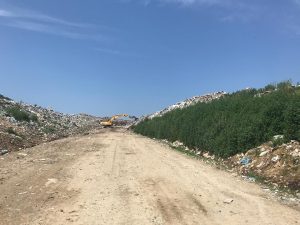
Why should everyone have their own garden? –
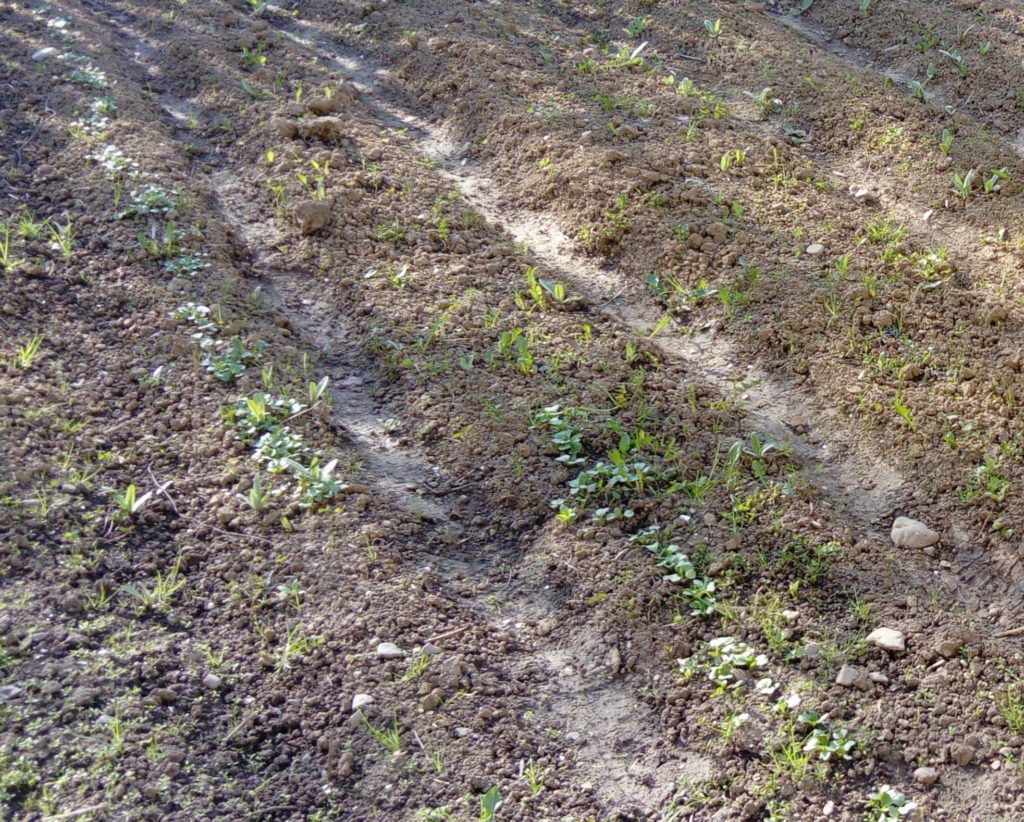
There have been many talks about the usefulness of your garden so far. Why are there so many doubts, especially among urban people, though they do not have the space to grow their own vegetables but for them there are so many different solutions for that.
We will still talk about the usefulness of your garden. Of course, this first requires a lot of work, but it pays off when you see the first fruits that you have grown with your own care and love. Initially you need to think about what you want to plant and where in the planning of the garden, and then it is easier. You take the tools you need and work can begin.
Everyone knows how beautiful the products on the store shelves are compared to their garden products, but do they all know why these are so beautiful. They are full of chemicals and often do not have the right taste. You can compare your garden as a paradise garden, where you have to offer and take everything you can give in the nature and in the mouth and pot. Created without using any plant protection products. It’s not all in colossal quantities, but just so that you can get your vitamin and other essentials right here, from your own garden and from the surroundings. Also medicinal plants. What is cheaper and more profitable for you, whether to buy foreign juices, supplements, chemical-treated fruit and vegetables for expensive money, or to use clean and fresh produce from your garden?
In your garden you will find almost everything, that can be for immediate use or as a herbal medicine. I can give you a few examples if your home garden growing these:
Sorrel- a fresh and crunchy spring source of vitamin C, which quickly relieves stress and provides a beautiful complexion.
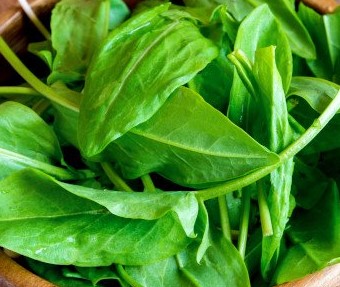
Dandelion- a powerful body cleaner. From root to flower, dandelion are highly nutritious plants, loaded with vitamins, minerals and fiber.
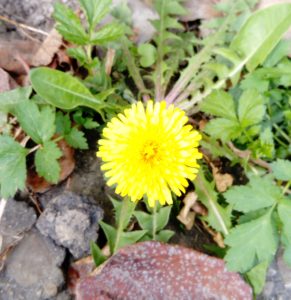
Common nettle- cleanses the body by removing excess fluid from the body and reducing swelling, this contributing to weight loss. Nettle contains rich iron, in addition to proteins and silicic acid. As an evaluated herbal remedy, it helps with many diseases, relieving inflammation and lowering fever.
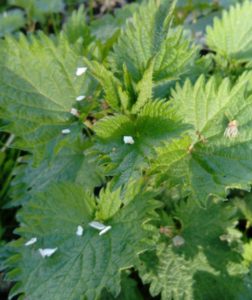
Plantago- it is found on the side walk, as well as on the roadside. This plant is also useful in several fields. Namely, the insect bites, to treat cough and in case of digestive problems.
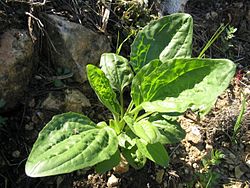
But first and foremost, vegetables, fruits and various berries are grown for their own use in gardening. This is primarily because of the need for free chemical products. It is nice to cut tomatoes and cucumber slices, which has grown in your own garden, in the morning, as well as bake delicious pastries from different berries.
Making your own garden and caring for it later is like a free gym, you don’t have to pay for it, editing in the garden equals the energy spent in the gym, but the result is bigger and more noticeable than just going to the gym. You will get two in one, keep yourself in shape, and in return you will get your own garden products that you have spent time and energy on.
Enjoying the way plants grow. I know you see a lot of effort, patience and time. Many say they do not have the appropriate requirements, but they must be noted.
There is something self-evident, it is great, it is possible, there is to do it, it is necessary to have it, it is necessary what balcony you have.
In the early stages of gardening, we want to experiment, try and forget that everything we have created cannot escape. The more it is, the more difficult it is to remember that your strength will not be underestimated, at first to plant a little, and then, if necessary, to increase the amount you want to grow, because after cultivation, you will have to deal with the later, how to maintain what to keep in mind. So you have to get a little patience and time to take care of everything, because otherwise it doesn’t make sense if all the stuff is wasted or the work is overwhelmed and it will make you sad. Of course, it all depends on the year, whether there are favorable conditions for it or not.
Owning a garden does not mean that you only have to grow vegetables, but you can only grow flowers, grow what you want. But if you have enough space, you can grow both of them, build a garden of gardens and have a vegetable garden. Then there are both products and beauty on the eye.
It is up to the owner of each garden to decide what he wants to grow, for what purpose and to what extent.
Strength and agility in achieving this goal and the patience of awaiting the results, which is a great joy when the first germs grow.
—
Au fost multe discuții despre cât de nefolositoare este grădina ta în ultimul timp.
De ce sunt atât de multe dubii, în special printre persoanele din mediul urban, ei nu au spațiu să îşi cultive propriile legume, dar au multe soluții pentru asta.
Tot o sa vorbim despre cat de nefolositoare este gradina ta. Desigur, e nevoie de multă muncă, dar se merită când vezi primele fructe pe care le ai crescut singur cu propria dragoste si grijă. În primul rând trebuie să te gândești la ce vrei să plantezi şi unde în grădină, apoi e mai ușor. Îţi iei uneltele de care ai nevoie şi treaba poate să înceapă.
Toată lumea ştie cât de frumoase sunt produsele din lădiţele din magazine în comparație cu produsele din grădină, dar oare ştiu ei de ce sunt asa de frumoase? Sunt pline de chimicale şi de multe ori nu au gustul corespunzător. Îţi poți compara grădina cu grădina din paradis, unde trebuie să oferi si să iei tot ce poți sa dai în natura , în gură si în pământ. Să fie create fără sa folosești orice produs pentru protecție. Nu este totul în cantități colosale , dar doar să îți poţi lua toate vitaminele si lucrurile esențialele chiar de acolo, din propria gradina sau din imprejurimi . De asemenea plante medicinale. Ceea ce e mai ieftin si mai profitabil pentru tine, decât să cumperi sucuri străine, suplimente , fructe chimic tratate, si legume pentru multi bani ,sau sa folosești produse curate si proaspete din grădina ta ?
În grădina ta vei găsi aproape orice, care poate fi pentru uz rapid sau medicina cu plante. Îti pot da câteva exemple:

MĂCRIŞ- o sursa proaspăta şi crocanta sursa de vitamina C, ce reduce stresul rapid si asigura

PĂPĂDIA- un puternic purificator al corpului. De la rădăcină la floare, păpădiile sunt flori pline de nutrienţi, vitamine, fibre si minerale.

URZICA- curăță corpul îndepărtând excesul de lichide din corp si reduce umflarea, contribuie la pierderea în greutate. Urzica conține fier, în plus proteine si acid silicic, evaluat remediu medicinal, ajuta la multe boli, ameliorarea inflamării si scăderea febrei.
 PLANTAGO- se găsește pe ,de asemenea pe şosea. Această plantă este folositoare în numeroase campii. Conform numelui, insecta musca
PLANTAGO- se găsește pe ,de asemenea pe şosea. Această plantă este folositoare în numeroase campii. Conform numelui, insecta musca
Dar in primul rand, si cel mai mult, legumele, ructele si numeroase sunt cultivate pentru propria lor utiliare in gradinarit. Asta se intampla mai ales din cauza necesitatii de produse fara chimicale. E dargut sa tai rosii si castraveti in felii, care au crescut in propria ta gradina, de asemenea si sa coci delicioase din diferite
Sa ti faci propria gradina si sa ai grija de ea, mai tarziu e asemenea unei Sali de sport gratuite, nu trebuie sa platesti pentru ea, ingrijind in gradina echivaleaza energia consumata la sala, dar rezultatul este mai mare si mult mai observabil decat mersul la sala. Vei obtine 2 in 1, te pastrezi in forma si in schimb vei obtine propriile taleproduse de gradina pentru care ai consumat timp si energie.
Te bucuri de felul in care plantele cresc. Stiu ca vezi mult efort, rabdare si timp. Multi spun caai nu au cerintele adecvate, dar si ele trebuie observate.
În primele parti ale grădinaritului vrem să experimentăm, să încercăm si să uităm ca tot ce am creat nu poate scapa. Cu cat e mai mult, cu atât e mai dificil sa ti aduci aminte ca puterea ta nu va fi subestimata, la început plantezi putin, apoi, daca e necesar, ca sa cresti cantitatea pe care vrei sa o cresti, pentru ca după cultivare, nu va trebui sa , cum sa mentii ce vrei să tii minte. Deci trebuie să ai putina răbdare si timp sa ai grija de tot, altfel nu are sens dacă materialele sunt risipite, sau munca e copleșitoare si te va face trist. Desigur, depinde de an, daca sunt condiții favorabile sau nu.
Sa ai o grădină nu înseamnă ca doar trebuie să cresti legume, poti sa cresti doar flori, ce vrei tu. Dar daca ai destul spatiu, le poti creste pe amândouă, sa faci gradina grădinilor si să ai o grădină de legume. Atunci sunt ambele produse si
Deținătorul fiecărei grădini decide ce vrea sa crească, pentru ce scop si ce sa extindă.
Puterea si agilitatea în a îndeplini acest scop si răbdarea pentru a aștepta rezultatele, e multa fericire când primii germeni cresc
The 5 important tips and tricks to organize treasure hunt
What is it, the treasure hunt, loved by children but not only for kids, you can also make it for adults. How can it be carried out?
Treasure Hunt is a classic landscaping game where players search for a lost Treasure Chest according to legend. Exploring the countryside and visiting the “distant lands” ends with an unpredictable finale-finding the treasure chest.
Organising a treasure hunt may seem like a lot of work, because it needs to be thought through to the details but the end result is worth it. In this article you will find the main points to keep in mind when starting to plan a treasure hunt. At first, it seems very simple and straightforward, but if you are one of those, who have to organise it, then it turns out that you have a lot things to work out, to get a workable solution.
Because children enjoy being active and working together, it is a positive thing to enjoy the reward later. Even though this treasure chest filled with candy is a fun find for most kids, the real treasure is in the hunt!
How to start it. First, you need to find a theme, a story that builds up all the treasure hunting activity. Next part is the place, it can be done indoors or outdoors, but usually it’s easier to organise it outdoors. Then you will need to know the tasks that the participants will need to complete in order to move on to the next point. Last but not least is a hint that will help your participants to go to the next point.
Now a few tricks to simplify the organisation of this activity:
-
Plan your route. Ask for locals to help you, when you do not know the area well, they can also help you for the translation part, if you work with people, who do not speak your language.
-
Determine the Number of Clues You Will Have – Set a number of clues from the very beginning. This will make the rest of your planning much simpler. Don’t forget to consider the age and size of the group.
-
Give yourself lots of time to plan – It took time to map out a route, identify good places for clues and write out the hints for each place. Once the mental work was done, the physical prep felt much less onerous.
-
Prepare for contingencies – like sealed all the clues in plastic bags so they wouldn’t get soaked in the event of rain.
-
Go with them – it would have been great to have one or two people with the group—one to race ahead with the speedier kids and one to bring up the rear with the dawdlers.
After all that, do not forgot to enjoy it. Even it is a competition the main part need to be fun. It is a pleasure to see in the eyes of the children that they enjoy for the whole event you have organised for them.
Treasure hunts are a fun and easy way to enjoy time with your kids, strengthen your staff through team building, or enjoy time with friends and family. Competition encourages teams to work together or individuals to think creatively and build resourcefulness.
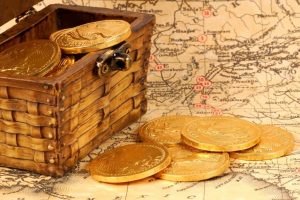
My reflection about the competition of essays
Since the end of January I have been in Romania within the framework of an EVS in the organisation Curba de Cultura. And thus also in a project called BYSC-E, in which there are two more volunteers, with whom I also share a house.
Now about 8 months have passed and we have organized many different projects and events.
The basic idea of the project is to teach children and young people about environmental issues. But apart from imparting knowledge, it is also (and above all) about rising awareness towards topics such as recycling, environmental pollution and one’s own ecological behaviour. The mediation takes place in schools and outside the schools.
In the course of time we have planned and carried out many “school lessons”. But our didactic plan differs from that of the school. We focus on non-formal education and structure our lessons accordingly.
We go to schools and build bins with the young people in which they can separate the trash and we talk to the pupils about recycling and the responsibility of each individual. This usually takes place in the lower grades.
We try to convey knowledge in an interesting and appropriate way for the target group, through games or interactive design.
We also offer many activities outside the school. On World Environment Day, for example, we have organized an exhibition and a debate in our youth centre. We have invited young people to talk to them about their future in an increasingly globalised world and what opportunities each individual has to contribute to a more ecological world.
During the school holidays we organized a camp in which we dealt with four days of environmental topics. We did workshops with the children where they could try out how to make useful things out of trash. We also organized a hike with the children to pick up the trash in the forest.
Besides these activities, there were also activities for which each of us was individually responsible.
As described above, we go to schools to discuss environmental issues with the students. Besides lower grades we also went to high schools.
In this context I was responsible for a certain activity.
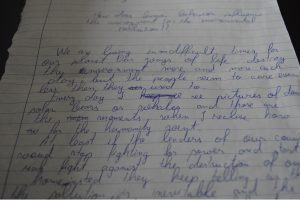
The idea was to organize a competition based on creative writing in the 12th grade. Of course thematically appropriate. So I thought about which topic could be interesting for the target group and how I could implement it. The topic was “How does human behavior influences the environment ( or the environmental pollution) ?”
I decided to leave it up to the students to choose which text form to use, so it could be an essay, a poem, a song or something like that. The idea was to give the students the plan so that each student could write something. One week after the writing I should go back to the same class to “award” the best text and go deeper in the topic.
So I went to school with this plan. I presented my idea to the students in the presence of the teacher and focused on the free choice of text. I think this was something new for the students. The focus, as mentioned above, is on non-formal education. I wanted the students to know that they could express themselves the way they wanted.
But (unfortunately) it went a bit different. While I was still explaining my plan, I was interrupted by the teacher who reminded the students how to structure an essay and remind them of the corresponding school lessons. She also told the students that they should substantiate their texts with many facts. I explained again that each student can express him- or herself as (s)he wishes. And that it will not evaluate with marks. So the students started writing and every student wrote something on his or her paper. I took the texts with me to read them. Contrary to my expectations, many students disregarded the teacher’s instructions and wrote very personal and poetic (regardless of a perfect structure) texts. Much to my delight.
The next week I went back to class to talk to the students about their texts. Unfortunately there was no real discussion and I decided to change the content of the lesson. I also decided not to award the best text.
Two things I learned during this activity or were a gain in knowledge for me:
1. I was very surprised by the content of the students’ texts. Most of the students drew a gloomy picture of the future in relation to the environment and seemed more or less helpless and powerless in their responsibility.
2. I and we propagate again and again a knowledge transfer based on non-formal education. Not only since our project, but for many years. I have found (and not only in this activity) that it is still new territory for teachers and that they find it difficult to implement or accept this form of education.
It’s no big surprise that some teachers have a hard time with these aspects. I think that the school system (not only in Romania!) is largely based on a clearly formal curriculum and this determines the everyday life and thinking of the teachers. So they are certainly very well educated in their field and know how to transport this knowledge in the way mentioned above.
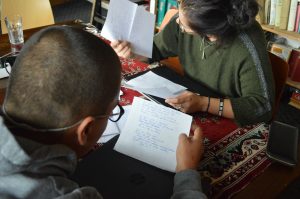
Nevertheless, I and we try to implement other aspects of education, not only the mediation, but also the contents into the everyday school life.
Fortunately, we have cooperations with the schools in the area and can slowly but surely introduce a different kind of mediation. Not to replace the teachers, but to supplement them!